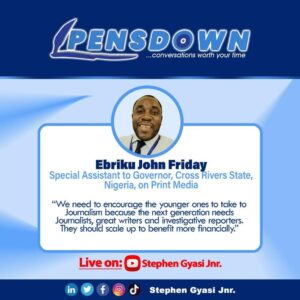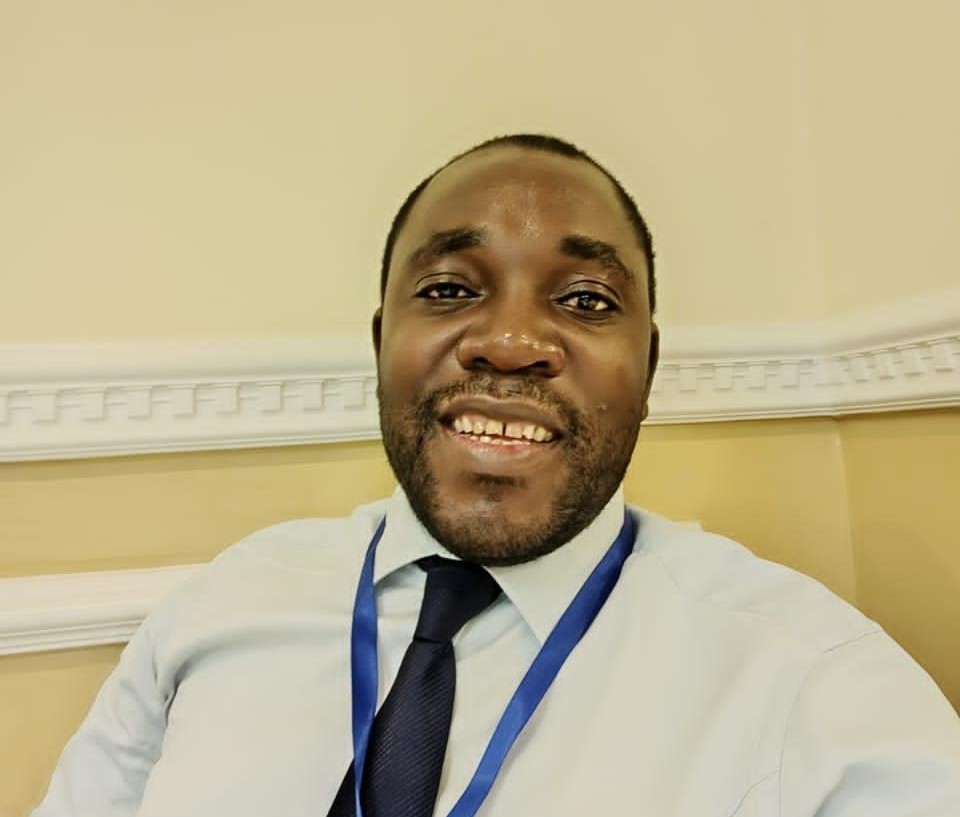In this Edition of PENSDOWN, From Africa’s, largest economy, Nigeria, Ebriku John Friday, Special Assistant to Cross River State Governor, tells his own story as a practising Journalist for over two decades, Here is the discussion with Ghanaian Journalist, Stephen Gyasi Jnr.
You read Economics in the university, how did you end up as a Journalist?
It’s just the flair of writing. Basically because while in school I was very close to journalists and my Journalism journey started with Writing articles on church bulletins. I had that opportunity to express myself and I would send in the articles to be published and so that is how my confidence grew though I read economics in school, in real life today, I’m a practising journalist. That is the best way I could express myself, to tell my story around my environment. And in leadership, where I worked, when they send me to analyze business reports, I could go and also do a bit of analysis, since I studied economics.
In the newsroom, you have occupied virtually almost all available positions or most available positions, which assignment, while on the field do you think stands out as the most challenging?
It is reporting agriculture. At a time I reported the agric sector and you know, it takes you to the trenches. You have to travel at times, to go and meet these farmers on their farms. So it is Challenging because you have to travel very far to interior places. The challenge of being attacked, the challenge of all of the hassles of travelling, safety and all of that, for me those are part of the things. Because when you go to those farmers, they are welcoming, but you need to go on the farm to see and understand what their challenges are, for me that was a huge one.
:
How long have you been in journalism?
I’ll say, it’s above 20 years now. In 2003, when I covered the inauguration of former president Olusegun Obasanjo. Then I was with a medium called ‘Essence magazine’ I was among the few young people who were at Eagle Square that year to cover that event. Then I covered the National Assembly at some point before I moved on to Wiki Star and also the ‘News World’ magazine. So it is over 20 years now.
Over 2 decades of penmanship. Will you say journalism pays?
It pays and for me it’s not even the money, it’s the passion. That is why I remained there. It’s the passion and the fact that I have the opportunity to express myself. At times I do reports that there are no strings attached to the report like human angle reports about the community, it goes a long way to tell you that you are expressing yourself and you’re also saving someone or a community that is challenged. Attention is being drawn to those communities today. Communities without power supply issues, with bad roads, issues with water and all of that.
We go to those communities, and nobody pays us but just the passion and concern make us go to those communities and file our reports to be published and the next few weeks you see the government going to those areas to fix those Challenges. That is the joy, for me that is big.
Then tomorrow, someone takes note of you and can say “Come, do this for me” That is where you reap from. I had the opportunity of travelling to Israel, Spain, and Germany with all expenses paid by people that saw my reports and then called me to come and work for them.

These more than 20 years you have held on to your pen, attrition has been high in journalism, and many highly trained and qualified professionals have abandoned the boat, some of them into public relations, corporate Communications and anything that will give them survival, what do you think accounts for the high level of attrition?
When you grow up in life, you begin to see that there are certain things you want to achieve and you couldn’t get them, those who are journalists and delve into politics, are well-to-do today than their colleagues.
My publisher in ‘Leadership’ then, for example, was a pharmacist, but because of his passion to tell stories, to redefine the pen sector, he opened ‘Leadership and it became a flagship today and it’s one of those top-rated newspapers in Nigeria. So he delved into it, left his profession and made it.
People have a lot of responsibilities to bear and that is why some move on to other opportunities.
The problem is also that clearly up till now, some journalists continue to suffer because they do not look at the business angle of what they are doing.
One of my colleagues travelled all the way to my state and came back to give a report. The report is on an Institution that helps farmers, I asked can he not also try to get some slots as a Journalist who sponsored his trip. A slot will pay you better. so when covering beats, make friends and try to negotiate slots for yourself.
How many times in the line of duty were you approached with anything material or monetary to compromise the details of any report you were doing?
For me, I have never. Because, one, when you deal with those sorts of people, they know my position, my stand, because when you are dealing with people, the way you position yourself, they can tell that this person is different.
When I was covering agric, the person covering the beat before me never got an advert, but when I got there, I looked at the angle of the report, I do articles and publish. And I was called one day for advert negotiation and that was how I got adverts, so there’s a way you will live your life as a professional nobody needs to come and reduce you because they know your stand, you’re not there for the brown envelope, so you are known for that.
When I cover my beat as soon as I am done, I am gone.
This is how journalists should be, you don’t need to wait for the brown envelope, let your report stand you out. I do my stories and I go, at times you do a report, submit and the newsroom refuses to use your report, sometimes your boss in the office may kill certain stories.
So I have never had such an experience where I was confronted with bribes because of the way I position myself.
There is an increase in Political ownership of the Media, so many Political actors and politically exposed persons are setting up media outlets, we are a fledging democracy, are we courting trouble or all is well?
It is all about control and being able to tell your story, because, in an area where you don’t have a medium, you discover that the other media are biased against you. Today, you invite a politician to your platform and you are asking some questions that have a tone of attack, making him feel as if you brought him to come and be embarrassed, so you discover that there is no fairness. A medium does a report and there is no balance, because he didn’t 💎 to the other person, so because of this kind of one-sided Journalism, politicians will set up their own media to expose themselves and have like a base on the media where they can be defended.
So that’s the issue, I’ve been in the newsroom for a long time, I know when the newsroom is not with you, all manner of reports may be published, but when they are with you, they will stop all reports against you.
So when people who are exposed see all these tactics, they have to get their own medium and get professionals on it, so when it comes to issues revolving around them, their medium will stand with them.
In Nigeria, the President-Elect, for example, owns ‘The Nation and ‘TVC’. So during the campaign, those two mediums have been championing and reporting positive news about him, but in other ones, you see scary reports and so on.
So, If there is no balance, we will not get to know the facts and we see where a reporter will do the story and send it to the office, the next day you will not know that you did the story as they will twist it and bring so many other things.
So, if I am a politician in the line of fire, I will also like to have my own medium, to balance with my own part of the story.

